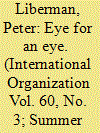|
|
|
Sort Order |
|
|
|
Items / Page
|
|
|
|
|
|
|
| Srl | Item |
| 1 |
ID:
073980


|
|
|
|
|
| Publication |
2006.
|
| Summary/Abstract |
Retributiveness and humanitarianism, predispositions that shape individuals' moral judgment and criminal punishment attitudes, should also influence their positions on war against evil-seeming states. Retributiveness should heighten support for punitive uses of military force, satisfaction from punitive wars, and threats perceived from transgressor states, while humanitarianism should have the opposite effects. Using death penalty support as a proxy measure for these values, public opinion about the 1991 and 2003 Persian Gulf wars provides evidence for a moral-punitiveness effect. Death penalty supporters were significantly more hawkish than death penalty opponents in both cases, controlling for ideology, utilitarian logic, and other potential confounders. These findings explain why foreign villains and good-versus-evil framing heighten public support for war.
|
|
|
|
|
|
|
|
|
|
|
|
|
|
|
|
| 2 |
ID:
058020


|
|
|
| 3 |
ID:
077066


|
|
|
|
|
| Publication |
2007.
|
| Summary/Abstract |
There is a substantial moralistic streak in U.S. elite attitudes about war against states perceived as evil. Among opinion leaders, death penalty supporters were substantially more likely than opponents to support the 1991 Gulf War, condone the Iraqi death toll, and favor escalating the war to topple Saddam Hussein. These relationships persist after controlling for ideology, nationalism, and instrumental beliefs about force and thus probably result from individual differences in retributiveness and humanitarianism, moral values known to underlie death penalty attitudes. Foreign policy expertise moderated this effect only on the regime change issue, and then only moderately, suggesting that "moral punitiveness" might also influence the thinking of decision makers. President George H. W. Bush evidently felt real moral outrage during the crisis about Iraq's aggression, but he refrained from escalating the war to punish Saddam more severely for it.
|
|
|
|
|
|
|
|
|
|
|
|
|
|
|
|
| 4 |
ID:
120126


|
|
|
|
|
| Publication |
2013.
|
| Summary/Abstract |
This article tests the hypothesis that ordinary people favor punishing badly behaved foreign actors to make them "pay" for their crimes rather than purely to protect national security interests. In an undergraduate sample, people's endorsement of the principle of retributive punishment was related to their support for punishing transgressor states and their support for torturing detainees, controlling for partisanship, ideology, humanitarian and security values, and beliefs about the efficacy of force. The interstate transgression scenarios included a state sponsoring terror attacks against a rival, a nuclear proliferator, and a small, unnamed aggressor. Retributive dispositions were also strongly related to support for the death penalty, which helps explain prior findings that American death penalty supporters are unusually bellicose toward foreign wrongdoers.
|
|
|
|
|
|
|
|
|
|
|
|
|
|
|
|
| 5 |
ID:
167079


|
|
|
|
|
| Summary/Abstract |
US public anger and desire to avenge the September 11, 2001 terror attacks were redirected toward Iraq partly because of its identity as an Arab and Muslim state. Online panel survey data reveal that citizens who were relatively angry about the terror attacks were more belligerent toward Iraq, an effect that was strongest among those who perceived Arabs and Muslims in monolithic terms. The angry desire to avenge 9/11 was more persistent for those who saw Arabs and Muslims in that light, and its effect on war support was partially mediated by worsened feelings about Arabs and Muslims in general. These findings help explain why public belligerence toward Iraq shot up right after 9/11, before President George W. Bush began alleging that Iraq was pursuing weapons of mass destruction and had ties to al Qaeda.
|
|
|
|
|
|
|
|
|
|
|
|
|
|
|
|
|
|
|
|
|